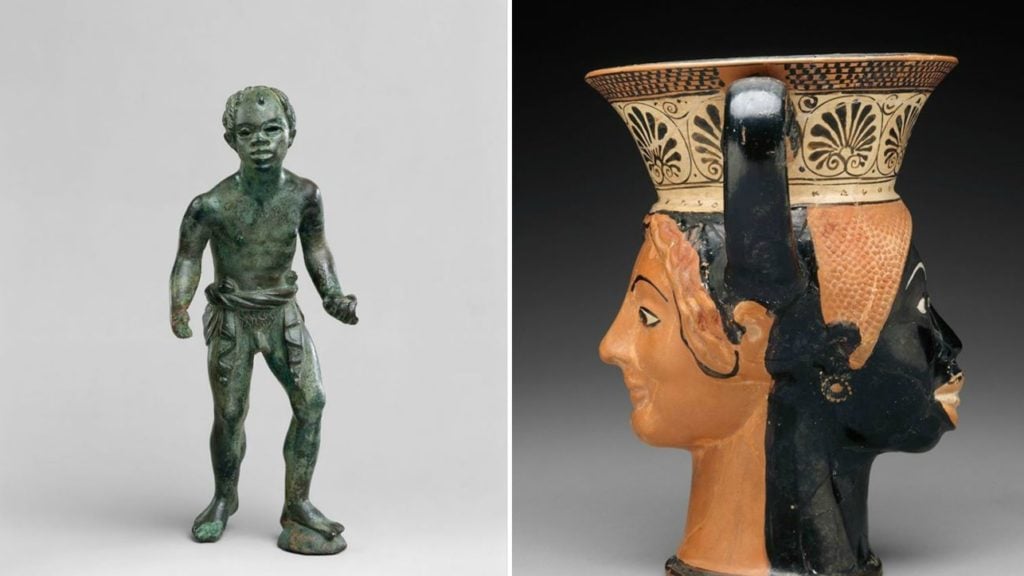Welcome to DU!
The truly grassroots left-of-center political community where regular people, not algorithms, drive the discussions and set the standards.
Join the community:
Create a free account
Support DU (and get rid of ads!):
Become a Star Member
Latest Breaking News
Editorials & Other Articles
General Discussion
The DU Lounge
All Forums
Issue Forums
Culture Forums
Alliance Forums
Region Forums
Support Forums
Help & Search
Anthropology
Showing Original Post only (View all)'Black' Africans and the Ancient Greeks [View all]

Dean Kalimniou
15 June 2020 10:14am
As a result of George Floyd’s murder and the rise of the Black Lives Matter movement, there have been calls to decolonise the academic fields of Classical and Byzantine Studies. For the edification of those mystified as to the connection between these seemingly arcane fields and the problem of systemic racism, it is argued that historically, these fields of study have been dominated by a western European discourse that, in the case of Classical Studies,, appropriates them from their natural context, presenting them as the foundation of “western” civilisation, asserting the primacy of that civilisation and by consequence, culturally and ethnically dispossessing the modern inhabitants of the lands in which they were engendered from that lineage.
Since Gibbon, in the case of Byzantine studies, false narratives of white supremacy and western superiority have also been propagated, portraying the Greek and Syriac speakers of Byzantium especially as effete and morally corrupt, while presenting the entire history of that civilisation as a debased and illegitimate form of the ancient Greek ideal that the West claims as its own. This form of Orientalism has caused an ontopathology of self-loathing and insecurity among peoples in the Empire’s successor states. In the case of the modern Greeks, it has resulted in the West colonising our own historical narrative and denying them the opportunity of viewing the linear progression of their history within the context and unique perspective of their own native tradition.
The well-worn cliché, propagated by western classicists and parroted by thousands of Greek school teachers around the world, that “ancient Greeks were blonde and blue eyed,” (and that by inference, the darker one is, the less Greek and the less worthy one is also)” embeds a racist discourse that was completely alien to the way ancient Greeks viewed people of colour. If Classical Studies are to be indeed “de-colonised,” a good starting point would be this simple proposition: That the ancient Greeks had no concept of racial superiority based on the colour of a person’s skin and that consequently, the relationship between ancient Greeks and peoples of colour, especially in Africa, was one of enduring curiosity, admiration and fascination.

Janiform kantharos with heads of a male African and a female Greek, ca. 480–470 B.C. African artists used specific hairstyles to convey a figure’s class, religious affiliation or social standing, but this Greek artist relied on racial stereotypes. The subjects may represent Herodotus’s theories of racial difference or a display of slaves and female companions in the service of Greek men.
That is not to say that ancient Greeks did not notice difference in colour. Having encountered Africans during the process of setting up colonies on the North African coast, and later confronting them in the Persian army that invaded Greece (Africans were among the soldiers said to have fought at Marathon), the ancient Greeks employed a number of terms to describe them, generally referring to them as “Ethiopians,” and using various terms to describe the colour of their skin, Hesiod referring to the physiques of the «κυανέων ἀνδρῶν» (dark-skinned men), and Aristotle, to those «τὸ τὴν χρόαν μελάνων» (those with dark skins). Archaeological evidence suggests that Greeks encountered Africans at a very early time in their history; one is portrayed on a mask found in a Bronze Age tomb in Cyprus. Homer casts Eurybates, Odyssey’s herald as an African, describing him as «οὐλοκάρηνος» (wooly-haired) and «μελανόχροος,» (dark hued), and states that Odysseus honoured him above his other comrades. As a hero, he is depicted on a shield in a 5th century vase painting. Africans appear also in depictions of worshippers of Demeter and Persephone in Acragas, suggesting that there was no colour bar to participation in ancient Greek religious rites.
More:
https://neoskosmos.com/en/167708/black-africans-and-the-ancient-greeks/
2 replies
 = new reply since forum marked as read
Highlight:
NoneDon't highlight anything
5 newestHighlight 5 most recent replies
= new reply since forum marked as read
Highlight:
NoneDon't highlight anything
5 newestHighlight 5 most recent replies